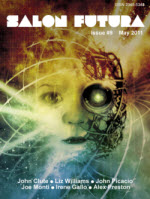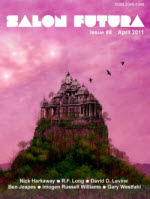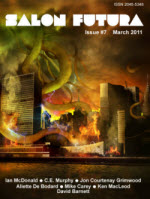Finncon 2019

 How do you write a review of a convention at which you were a Guest of Honour? I mean, it wasn’t perfect. No convention, not even a Finnish one, is ever perfect. Here, however, I will be turning a blind eye to whatever small things went wrong, for it would be churlish to point them out when I had such a good time. You may therefore see this as more of a report than a review. That’s OK by me.
How do you write a review of a convention at which you were a Guest of Honour? I mean, it wasn’t perfect. No convention, not even a Finnish one, is ever perfect. Here, however, I will be turning a blind eye to whatever small things went wrong, for it would be churlish to point them out when I had such a good time. You may therefore see this as more of a report than a review. That’s OK by me.
I should probably begin a few days before the convention. My friends Otto & Paula, who live in Helsinki, had offered to drive me up to Jyväskylä, where the convention would take place. They also offered a little tourism along the way. That began with a side-trip to the Estonian capital, Tallin.
Being a rather small country, Estonia makes money as best it can. One of the wheezes it has come up with is to lower alcohol taxes significantly so as to lure day trippers from around the Baltic. The Finns, most of whom have never met an offer of cheap booze that they didn’t like, are all in favour of this. So the ferry from Helsinki is very busy and has even more impressive on board shopping than the one to Åland.
We, however, were more interested in being actual tourists. This is how I discovered that in the 13th Century the Christian nations of the Baltic, finding it inconvenient to head for the Holy Land, opted to serve God instead by launching Crusades against their heathen neighbours. This year saw the 700 anniversary of the conquest of Estonia by a Danish Crusader army. The anniversary gave us the opportunity to spend much of the day exploring the ruins of Tallin’s walls and castle, and generally keeping out of the way of the sun and the swarms of Chinese tourists.
If ever you happen to be in Tallin, I warmly recommend a restaurant called Farm. Don’t be put off by the cheesy taxidermy in the window, the food is superb. Indeed, it is so good that Ellen Datlow remembers it from her trip which I suspect would have been in 2017.
Then it was off up north. Otto proudly showed me his company’s Cray computer, which lives in a data centre in a midlands town. I also got my first introduction to 3D VR gaming, which I got to quite like once I understood that it was really a dance game, not a sword-fighting game. (I’m a fencer, I abhor sword-fighting games that encourage extravagant movements.)
That evening I got to stay in the Golden Dome Hotel in Iisalmi which used to be part of the local Orthodox Church. That would have originally been the Russian Orthodox Church, but it is now the Finnish Orthodox Church because the Winter War is a thing that happened. There cannot be many hotels in the world that have a dining room with a massive stained glass window and walls covered with religious paintings. I’m very pleased to have got to stay there.
On then to Jyväskylä and the convention proper starting, as is traditional with sauna. This was mainly for the Guests of Honour so it was a small event, and the convention managed to secure hire of a wood-fired sauna for us. This is the gold standard as far as sauna is concerned. Kersti Juva, one of the Finnish guests, told me that she wasn’t going to bother coming until she heard the location. Sauna is not a rare thing for Finns, but wood-fired sauna very much is.
The lake was a bit cold. I very much doubt that I’ll ever re-capture the magic of the last night in Tampere with Cat Valente where we had warm water and a superb sunset, but any evening of good sauna and skinny-dipping in a beautiful lake is something to be treasured. I only got one mosquito bite. It seems like the Finnish Air Force prefers the taste of Scottish persons to Welsh women. Poor Feòrag was covered in bites.
The convention put us up in the Hotel Alba, which GoHs at previous Jyväskylä Finncons will remember well. It is just down the hill from the University, where the con takes place, and on the side of a lake. (Jyväskylä, like Madison, is built on a strip of land between two huge lakes). Sadly the weather wasn’t great over the weekend and there wasn’t much call for breakfasting outside and midnight swims.
As is my wont, I attended the academic conference that takes place before the convention. We had some great papers, and I got introduced to a fabulous café which, sadly, I didn’t have time to revisit. That was Friday morning. In the afternoon us GoHs did a panel item where we were interviewed about our writing. Or, more correctly, Charlie Stross got interviewed about writing, Kersti got interviewed about translating, and I got interviewed about editing. Given the complexity of her subjects, Kisu did a great job of grilling us.
At this point I should say a few words about Kersti. I’d not heard of her before the convention, and I’m now very ashamed of that. Many years ago, as a young woman just learning her craft, she made the first Finnish translation of a book that was causing waves throughout the English-speaking world. That book was called The Lord of the Rings. Her translation was a huge hit, and Tolkien fandom is still a big thing in Finland today. In a very real sense, Finnish fandom would not exist in the way it does now had it not been for those brilliant translations that inspired a whole generation of fantasy readers.
Kersti has since gone on to a stellar career as a translator of mainstream literature. She has won the Finlandia Prize. She could easily turn her nose up at her youthful exploits, but she doesn’t. She seems to love fandom, and Finnish fandom absolutely adores her. For me the convention was like being a special guest at a party being thrown for someone who is the beloved grandmother of thousands of fans.
I had a fairly light programming load. There was a panel about sexbots which was a lot of fun. And there was a panel on Lovecraft which I got to moderate and which featured Charlie Stross and Hannu Rajaniemi. But my big GoH event was a solo talk which, to fit in with the AI theme of the convention, I titled “Robots before RUR: The Prehistory of Robotics”. It seemed to go down very well. If you’d like to see it, the Dublin Worldcon has invited me to do it for them. I’ll be on at around 15:30 on Saturday afternoon.
I did get to do the masquerade judging thing again. That’s become something of a tradition at Finncon. As a bribe us GoHs got treated to dinner at the local branch of Harald. So I got to introduce Charlie and Feòrag to the delights of cinnamon beer, tar ice cream and silly horned helmets. They loved it.
I should say a word as well about our other Finnish GoH. Professor Raine Koskimaa was the academic GoH and spent much of his time in the academic track. I only got to see him at dinner. He is an expert in games. That is, he works at a university and gets paid to play games for a living and write about them. How cool is that?
As I was a GoH I also got given a Kaffeklatsch. It was very kind of them, but really there is no need. I don’t have fans the way authors do. No one is keen to get to meet me and ask where I get my ideas from, or what will be in my next book. A few friends will doubtless turn up to one, for which I am very grateful, but overall it is a bit embarrassing for all concerned.
I didn’t go to much programming, but I did make a point of dropping in on the academic track to see Sylvia Spruck-Wrigley present the latest iteration of her research on older women in SF&F. It is a fabulous and much-needed project. Sylvia, bless her, kindly presented me with a little knitted Spawn of Cthulhu at the Lovecraft panel. For a cosmic horror it is remarkably cute.
All too soon it was Dead Dog time, and inevitably sauna. I did the traditional thing of plying the Finns with whisky to say thank you for having me. As always it went down well. Then it was time to rush back to Helsinki and head off to London. But it is not farewell. Next year’s Finncon will be in Tampere, and Mike Carey will be one of the GoHs. I cannot resist temptation like that. Finland, it seems, cannot get rid of me.
I should end by saying a huge THANK YOU to the convention committee, especially Irma who is the best friend anyone could wish for. Also thanks to Saija, Anne, Otto and everyone else who conspired to give me such a wonderful time.























